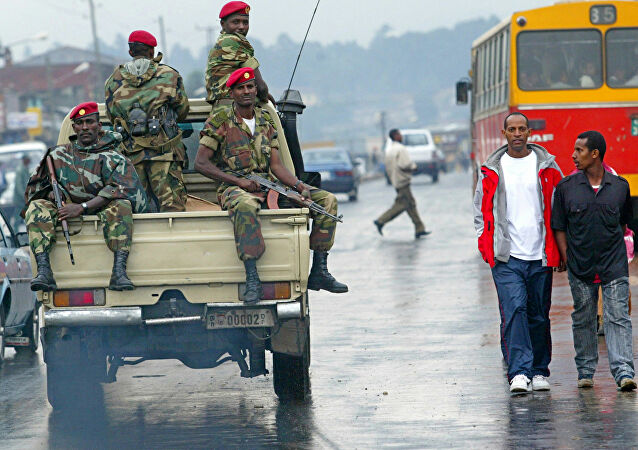التوتر بين الأقاليم والعرقيات في أثيوبيا ليس بحدث جديد لم تألفه أديس أبابا من قبل بل هو سمة بارزة في إفريقيا عموماً ولكن تكمن الغرابة في حجم المراهنة على تقسيم أثيوبيا وإنفصال أحد أقاليمها وكأن أثيوبيا دولة مهملة في القاموس الدولي وليست ركيزة من ركائز الميزان الدولي، فالقوى الدولية ترى في أثيوبيا دولة مركزية وقوة صاعدة في القرن الأفريقي ومؤهلة لقيادة شرق أفريقيا في السنوات الخمس القادمة وهذه الرؤية الدولية ليست حديثة عهد بل هي رؤية دولية قديمة تدعمها خصائص إختصت بها أثيوبيا على سائر دول الإقليم، فأثيوبيا دولة تاريخية عريقة فهي تمثل إمتداداً لمملكة أكسوم ومركز الأرثوذكسية وبها أقدم كنيسة ويتجاوزعدد سكانها المائة مليون نسمة ناهيك عن إمتلاكها لمصادر مياه ضخمة جعلها في مقدمة الدول التي تحظى بسباق دولي.
شهدت أثيوبيا مؤخراً تدهوراً حاداً بين الحكومة الأثيوبية وإقليم التقراي وسبب ذلك هو مصادقة البرلمان الإثيوبي على إحالة طلب تفسيرات دستورية بشأن إجراء إنتخابات في ظل التأجيل بسبب جائجة كورونا إلى مجلس التحقيق الدستوري للبت فيه ولكن رفض إقليم التقراي تلك الإجراءات وأعلن بدء إجراء إنتخابات وهذا ما أثار حفيظة الحكومة المركزية ودفعها إلى الإشتباك مع إقليم تقراي، وإختلفت ردود الأفعال في القرن الإفريقي جراء ما يحدث في أثيوبيا، فأسمره جاء دورها داعماً للحكومة الأثيوبية ضد خصمها جبهة تحرير التقراي، أما مقديشو فتنظر للأحداث الأثيوبية بعين الحرص على معرفة ما يجري أكثر من عين القلق مما يمكن أن تنتج عنه تلك الأحداث، أما جيبوتي فتنظر للأحداث الأثيوبية بعين الحرص و القلق معاً مما يمكن أن تسفر عنه تلك الأحداث المتلاحقة، ويعود برأيي السبب في إختلاف ردود الأفعال بين العواصم الثلاث إلى تاريخ علاقة أثيوبيا بتلك العواصم (مقديشو، أسمره، جيبوتي)، أما الخرطوم التي باتت تتحمل جزء من عبء تلك الإحداث بعد أن أصبحت حدودها تشهد تدفقاً بشرياً وجد في السودان ملاذاً أمناً بعد تصاعد الأحداث تبدو اليوم هي الأقرب للخيار الدولي لذلك أرجح تكليف السودان لمهمة تهدئة الملف الأثيوبي دعماً لدورالسودان في المنطقة وإدراكاً لتاريخ التعاون الأمني والإستحبارتي السوداني الأثيوبي خاصة أن الخرطوم ترى في وجود رئيس الوزراء الأثيوبي أبي أحمد عامل توازن في الإقليم لن تصل لمداه السودان في ظل الحكومة الإنتقالية، كما أن الإدارة الأمريكية الجديدة من المرجح أنها ستكون أقل ضغطاً وأكثرعملية ومرونة في ملف السودان والقرن الأفريقي فهي تستعد لمهام أمنية وإستخباراتية جديدة وتريد كسب ثقة السودان الجديد.
تداعيات المشهد الأثيوبي كيف قُرأت خليجياً؟
في ظل التطورات الأخيرة في السودان ومنطقة القرن الأفريقي خاصة بعد عودة السفارة الأمريكية إلى مقديشو بعد ثلاثة عقود أرى أن عملية ضبط التوازنات الإقليمية والدولية قد بدأت وعليه أرجح أن يتم تقوية أثيوبيا إستراتيجياً وذلك إما بتوقيع صفقة مع أسمرة لتمكين أثيوبيا من الموانىء الأرترية على البحر الأحمر في مقابل إنعاش إقتصادي لأرتريا وإعطاءها حيزاً من التقدير التي تفتقده في إقليمها مقارنة بأثيوبيا، وإما العودة إلى إحياء ملف الكونفدرالية بين أسمره وأديس أبابا خاصة أن أثيوبيا بإختلاف مكوناتها ترى أن الإستقلال الذي حصلت عليه أرتريا كان يجب أن يبقى مربوطاً بأثيوبيا عبر شكل من أشكال الكونفدرالية وتؤيدها في ذلك الرؤية الأمريكية التي كشف عنها ذات مره هيرمان كوهين مساعد وزير الخارجية الأمريكية للشؤون الأفريقية في لندن عام 1991 عندما لمس الموافقة الأثيوبية على إستقلال إرتريا فقال حينها “أن الولايات المتحدة لا يمكن أن تكون حريصة على وحدة إثيوبيا أكثر من الأثيوبيين أنفسهم، وأنا مُقتنع أن المتاعب التي ستواجه إرتريا ستدفع بها إلى إعادة النظر في إنفصالها عن أثيوبيا” وهذه الرؤية الأمريكية هي ما تُفسر تضاعف الدعم الأمريكي والدولي لأثيوبيا وإستثناء أسمره حتى من زيارة كبار المسؤولين.
من المرجح أن جبهة التقراي وفي ظل المناوشات العسكرية الغير متكافئة وتضاعف أعداد اللاجئين سوف تصل مع أديس أبابا لإتفاق ستتوقف على أثره هذه الحرب ولكن ليس معنى ذلك أنها أنتهت وهذا ما تدركة الحكومة الأثيوبية ومستعدة له جيداً، وستعمل جبهة التقراي على إبعاد رئيس الوزراء الأثيوبي عن المشهد السياسي بتعزيز التحالف مع خصومه في الداخل الأثيوبي ومن ثم القفز على السلطة لعودة حكم التقراي ولكن لا أرى لذلك أفقاً، فالظروف الدولية اليوم غير مواتية لحدوث ذلك ورئيس الوزراء الأثيوبي أبي أحمد يحظى بدعم إقليمي ودولي يرى فيه قائداً للمرحلة القادمة، وحتى وإن حدث عكس كل ذلك فما يهم الأطراف الدولية أن تبقى إثيوبيا موحدة وقوية حتى وإن إختلف رأسها.
في أفريقيا يُدرك الجميع أن المصالحات الوطنية والإتفاقيات السياسية مهما كان حجم الموقعون عليها لا تعصم الشعوب ولا حتى الموقعون عليها من نقضها إذا أرادوا ذلك وبالتالي لا ضمان لإستمرار المصالحة الأثيوبية الأرترية الموقعة في عام 2018 خاصة أن الأسباب التي بسببها إندلعت الحرب الإثيوبية الأرترية لمدة عشرون عاماً ما زالت قائمة، أضف إلى ذلك الشعور الداخلي المُسيطر على الرئيس الأرتري أسياس أفورقي بعدم تقدير واشنطن لأسمره، فأسمره ومنذ إستقلالها عن أثيوبيا في تسعينيات القرن الماضي إلى يومنا هذا وهي تحاول جاهدة طرح نفسها كحليف قادر على حماية المصالح الأمريكية حتى وإن أبخصتها واشنطن حقها وقللت من تقديرها وبالتالي ما الضير من الإقدام على مغامرة قد تعيد بها القوى الدولية النظر في أسمره، ففي حالة وصول جبهة التقراي إلى صفقة مع أسياس أفورقي (عدوها القديم) فستكون بلا شك صفقة قالبه للموازين وسيتم الإتفاق على التخلص من أبي احمد وباقي القيادات المؤهلة من الأورومو والأمهرا وإستعادة التقراي لحكم أثيوبيا في مقابل إحياء الحلم القديم لأسياس أفورقي بأن تكون جبهة التقراي جناحاً تابعاً له مما ينذر بتغير الخارطة السياسية لأثيوبيا وهذا ما يراود أسمره منذ عهود، ومن ناحية أخرى تتطلع جبهة التقراي غرباً نحو السودان التي لعبت الدورالرئيسي في وصول ممثل التقراي وباني النهضة الأثيوبية الراحل ملس زيناوي لسدة الحكم في يوما ما وهذا ما لا ينساه التقراي ولكن الخرطوم اليوم تبدو أقرب للحياد منعاً لإحتقان العلاقات السودانية الأثيوبية، كما أن الخرطوم ترى في وجود رئيس الوزراء الأثيوبي أبي أحمد عامل توازن في الإقليم لن تصل لمداه الخرطوم على المدى المتوسط، ولكن ذلك لا يعني أن التعاون بين التقراي وباقي مكونات الدولة الأثيوبية والخرطوم ضد أسمره غير وارد إذا إقتضت الحاجة، فأسياس أفورقي رغم عدائه القديم للسودان وللرئيس السابق عمر البشير إلا أنه يُدرك أن من يقود المشهد في السودان اليوم هم رجال البشير وهم مُخلصين له مهما حدث وبالتالي التعاون بين أسمره والخرطوم ليس مركزي بل هو تعاون شكلي إقتضته الظروف الحالية وسيبقى كذلك إلا في حالة إختفاء أسياس أفورقي من المشهد، وقلة الثقة بين أسمره والخرطوم هو ما يشكل فرصة ذهبية للتقراي وفي ذات الوقت صمام أمان لحكومة رئيس الوزراء الأثيوبي أبي أحمد التي يقلقها أي تقارب سوداني أرتري بوجود أسياس أفورقي أو أحد رجاله من بعده.
ما أريد أن أقوله أن الجوار الإقليمي لمنطقة القرن الأفريقي يُدرك أن الصراع بين أثيوبيا وإرتريا صراع قائم ومتجدد مهما بدا التحالف بينهما ظاهراً فكلاهما يرى نفسه مُمثلاً لتاريخ مملكة أكسوم وبالتالي الصراع سيمتد مُستقبلاً فيمن هو الأقوى أن يمثل إستمراراً لمملكة أكسوم وليس مهماً أن يكون هوالأحق.
خليجياً، دول مجلس التعاون الخليجي بالرغم من إختلاف رؤاها السياسية وتقاطع مواقفها في العديد من الملفات إلا إنها إجتمعت في دعم الحكومة المركزية الأثيوبية برئاسة رئيس الوزراء الأثيوبي أبي احمد حفاظاً على المصالح الخليجية المتنامية في أثيوبيا والقرن الأفريقي، ويبدو أنه من حسن حظ رئيس الوزراء الأثيوبي أبي أحمد أنه إلتزم بموقف الإتحاد الأفريقي المُحايد من الأزمة الخليجية وهذا ما عاد عليه بالنفع الكبير في جميع الملفات وليس فقط في دعم حربه الأخيرة مع إقليم تقراي، إلا إني أرى أن دعم دول مجلس التعاون الخليجي الأخير لأبي أحمد أثار بلا شك حفيظة عرقية التقراي التي قد تنجح يوماً ما في إستعادة السلطة لحكم أثيوبيا وحينها ستجد الحكومات الخليجية نفسها لا تتعامل مع قيادة سياسية لدولة بل ستتعامل مع خصم عُرف عنه منذ القدم أنه لا ينسى من ساهم في قتله، ومن ناحية أخرى أثار التدخل الخليجي في الأزمة الأثيوبية الداخلية حفيظة الأفارقة وتم طرح تساؤل مهم مفاده “هل كنا سنشهد هذا التدخل الخليجي لصالح الحكومة الفيدرالية الصومالية في حال تمرد إقليم صوماليلاند؟” وإجابة هذا السؤال هي ما تعزز التوجس والقلق الأفريقي تجاه الحراك الخليجي في منطقة القرن الإفريقي خصوصاً وأفريقيا عموماً وعليه أرى أن ذلك هو ما سيؤثر على مستقبل العلاقات الخليجية مع دول القرن الأفريقي وسيتفوق على حساب مستقبل العلاقات الخليجية الأفريقية عموماً وذلك بسبب أن التعاطي الخليجي مع قضايا القرن الأفريقي يختلف عن التعاطي الخليجي مع ذات القضايا في عموم أفريقيا، ففي الوقت الذي ترمي بعض دول الخليج بثقلها تارة لدعم حكومة مركزية ضد أحد أقاليمها وتارة لدعم إقليم إنفصالي ضد حكومة مركزية وتارة لمعرفة ما الذي يدفع أقاليم في القرن الأفريقي للإنفصال عن الدولة المركزية نرى أن ذلك الدافع الخليجي مختفي تماماً في أقاليم تطرح ذات السياق الإنفصالي في غرب أفريقيا مثلاً ناهيك عن حدة التنافس الدولي على الممرات المائية: البحر الأحمر، المحيط الهندي، باب المندب، خليج عدن .
د.أمينة العريمي
باحثة إماراتية في الشأن الأفريقي
{:}

